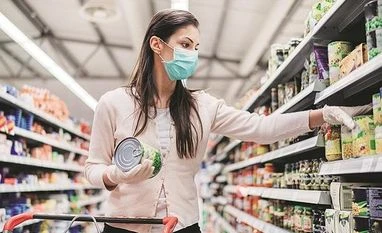The trend is expected to stay, going into May, as the daily caseload remains high.
India breached the 2.5-lakh mark in terms of daily cases on Sunday. The second wave, said FMCG executives, had revived interest in categories such as immunity and hygiene. This was after a brief lull between October and March as coronavirus cases began coming down during the period.
Consider this: At Metro Cash and Carry stores, an organised wholesaler, that supplies to retailers across the country, the offtake of products such as breakfast cereals, snacks, sauces and spreads has increased by 20-44 per cent in April compared to the previous month.
Demand for products such as honey, chawanprash and ayurvedic teas has jumped by 60 per cent in April. Data from the organised wholesaler, culled from its 28 stores in the country, shows that demand for masks and toilet soaps has spiked by 73 per cent and 157 per cent, respectively, in April against the previous month.
“People are beginning to follow safety protocols again, resulting in a higher demand for immunity and hygiene products. Packaged foods, on the other hand, are seeing a surge due to in-home consumption, which has picked up due to localised lockdowns,” said Arvind Mediratta, chief executive officer (CEO) and managing director (MD), Metro Cash and Carry India.
Maharashtra, Madhya Pradesh, Delhi, Gujarat, Karnataka and Uttar Pradesh are among states that have announced stringent curbs in recent weeks to curtail spread of the virus. These localised restrictions could continue into May if the threat of the virus does not abate, said experts.
Mayank Shah, senior category head, Parle Products, said his company was seeing signs of speculative buying and pantry loading in April, though it was not as strong as last year.
“Biscuits is a large processed food category in India. It is also an affordable product. As curbs grow, offtake has improved as people want to munch on a product at home that is nutritious and within their reach. But I do not see the kind of panic buying that existed last year for food products because supply-chain constraints have eased this year,” he said.
Industry sources say the growth in April so far for biscuits is in the region of 10 per cent against the previous month. If compared with the corresponding period last year, it is lower than the 20-25 per cent volume growth that biscuit majors such as Parle Products and Britannia had registered.
Even then, biscuit companies are not taking their eyes off the pandemic. The focus on health and hygiene, in fact, has prompted players such as Britannia to reformulate popular products like Milk Bikis, substituting ingredients such as maida with atta. Milk remains as an ingredient in the product. The product was launched last week across the country.
“The 100 per cent Atta Milk Bikis was launched in response to an increasing need for wholesome nutrition for children. A nationwide study that we conducted showed that 79 per cent mothers wanted the goodness of traditional food such as doodh-roti in the diet of their children. This prompted us to reformulate Milk Bikis,” said Vinay Subramanyam, vice-president, marketing, Britannia.
Direct-selling companies such as Amway have also seen a 30 per cent surge in demand for nutrition products such as tulsi, ashwagandha and protein powder under the Nutrilite brand in April.
Company executives said the firm was ramping up production of these items in line with consumption trends.
Mohit Malhotra, CEO, Dabur India, said consumption of chawanprash, honey and giloy had increased substantially in April and that additional production lines were being pressed into service. “Demand for these products remains robust and we are tweaking our production plans in line with these patterns of consumption that are visible in the marketplace,” he said.
To read the full story, Subscribe Now at just Rs 249 a month
Already a subscriber? Log in
Subscribe To BS Premium
₹249
Renews automatically
₹1699₹1999
Opt for auto renewal and save Rs. 300 Renews automatically
₹1999
What you get on BS Premium?
-
Unlock 30+ premium stories daily hand-picked by our editors, across devices on browser and app.
-
Pick your 5 favourite companies, get a daily email with all news updates on them.
Full access to our intuitive epaper - clip, save, share articles from any device; newspaper archives from 2006.
Preferential invites to Business Standard events.
Curated newsletters on markets, personal finance, policy & politics, start-ups, technology, and more.
Need More Information - write to us at assist@bsmail.in
)